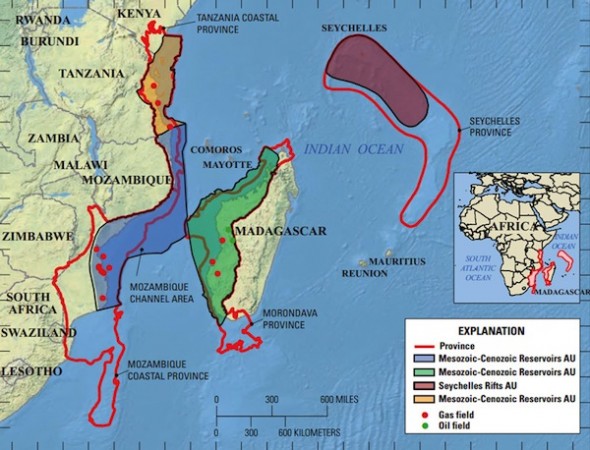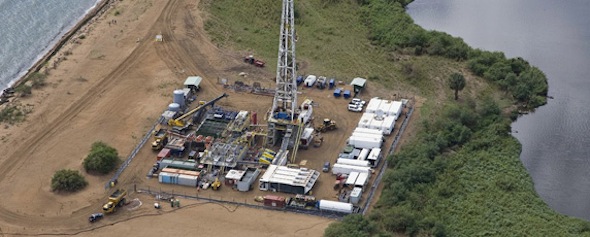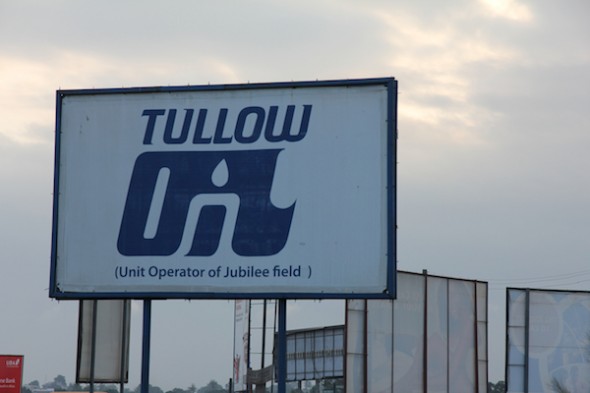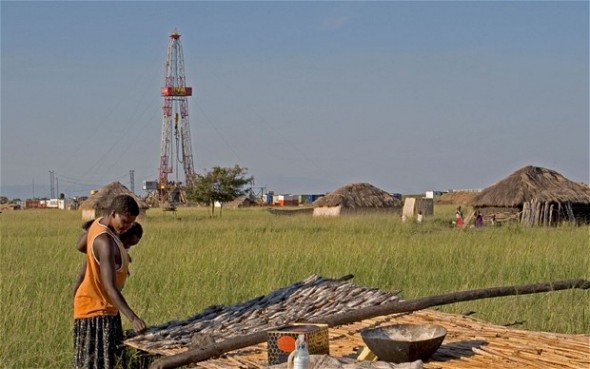East Africa and the resource curse: Where are the jobs, where is the power?

Lots of oil and gas, but will this translate into electricity and jobs? Map Credit: U.S. Geological Survey.
I’m catching up on news and have come across another recent article about East Africa’s oil and gas development. Avoiding the Resource Curse in East Africa’s Oil and Natural Gas Boom, draws attention to a fundamental problem with oil and gas development across Africa: minimal job creation and little or no increase in power (electricity).
Can any government really call oil a “blessing” if it doesn’t bring employment and power to the population?
The author, Jill Shankleman, is a senior scholar at the Wilson Center and former senior social and environmental specialist at the World Bank. “Up to now,” she writes, “oil companies and governments in developing countries have worked on a narrow model of economic benefit. Oil companies produce oil (and gas) for export. The government gets a hefty share of the profit in the form of taxes and product. To a greater or (often) lesser degree, efforts are then made to open up employment and supply chain opportunities locally.
“Where this model applies in West Africa, it is typical to find huge, state-of-the-art oil and gas export facilities sitting alongside communities where people live in houses without electricity. People like me who are involved in community consultations always hear the same thing when we speak with locals: ‘Where are the jobs? And why are we living in darkness next to this place which is stealing our oil?’”
Oil, Money and Secrecy in East Africa
Tom Rhodes, the Committee to Protect Journalists’ East Africa Consultant, has written an interesting story on the secrecy surrounding oil development in Uganda, Kenya and South Sudan. Rhodes writes that the inability of journalists to access information and report on contract deals and resource allocation greatly increases the risks for corruption and environmental degradation. Last year I wrote a post on Tullow Oil’s secret deals in Uganda, contrasting that situation to Tullow’s much more transparent operations in Ghana.
After I published that story a Tullow Oil representative contacted me and explained that Tullow’s practices were dictated by local governments. Tullow can be transparent in Ghana because the government wants to be transparent. In Uganda, the official told me, the government does not want contract information published.
Job woes and local content
The dearth of oil jobs in Ghana is back in the news again.
“Youth angry over elusive jobs in oil industry,” was the title of an article published in the Ghanaian press on March 12th.
The article cites Ebow Haizel-Ferguson from Sigma-Base Technical Services, who urges the rapid development of “ancillary industries.” I interviewed Haizel-Ferguson for “Ghana: Will oil mean jobs?” a short video I produced for the Pulitzer Center .
Oil brings in huge amounts of money, of course, and along with that comes expectations of many, well-paid jobs. The problem is that the industry – at least as it exists in Ghana now – doesn’t generate much work.
“Good” oil companies, “bad” oil companies
Tullow Oil has recently completed a controversial $2.9 billion sale of parts of its Ugandan oil stakes. Tullow’s deal with Total (France) and CNOOC (China), which had been mired in disputes with the Ugandan government for more than a year, was finalized despite a parliamentary resolution to suspend all oil contracts until laws and institutions are in place to fight corruption.
Uganda’s oil reserves appear to be significant, and there are indications that the region could be another oil bonanza. But at the moment, fears of corruption are dampening the mood. According to a recent article from the Associated Press Uganda stands to earn some $2 billion per year for the next 35 years, but:
“All signs are that Uganda will be the latest nation to fall victim to the ‘oil curse’ — cheated of its financial benefits by a corrupt government and left with extensive environmental damage,” said Uganda’s Association of Professional Environmentalists.
Critics are already complaining that more than $300,000 paid in signature bonuses on oil contracts already have gone missing. Legislators have accused the prime minister and two Cabinet ministers of taking millions of dollars in bribes from Tullow — charges Tullow denies.
The controversy surrounding Tullow’s operations in Uganda doesn’t fit with the image of Tullow Oil in Ghana.
Could Uganda Be the Next Niger Delta?
Oil reserves in Uganda, where Tullow Oil is also a major player, may be significantly larger than original estimates and that doesn’t make everyone happy. Here’s an interesting article from the Center for Global Development. The Center supports direct payments of oil rents to citizens; it’s what they call “Oil-to-Cash,” and I’ve included a link to one of their reports on the topic.





